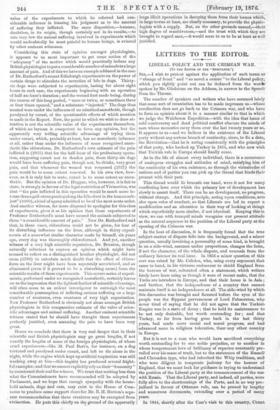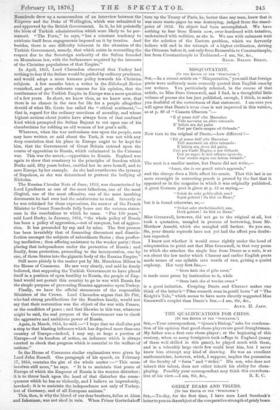LETTERS TO THE EDITOR.
LIBERAL POLICY AND THE CRIMEAN WAR.
(TO THE EDITOR OF THE "SPECTATOR."] SIN—I wish to protest against the application of such terms as "change of front" and "so novel a course "to the Liberal policy, which you rightly point out can be deduced from the words. spoken by Mr. Gladstone on the Address, in answer to the Speech from the Throne.
The number of speakers and Writers who have assumed lately that some sort of recantation has to be made impresses us—whose recollection does not go back to the Crimean war, and who have to form an opinion about it in a manner similar to that in which we judge the Walcheren Expedition—with the idea that hazes of cold controversy and dead political conflict obscure the minds of men whose memories carry them over the last twenty years or so.. It appears to us—and we believe in the existence of the Liberal party without any serious breach of continuity, since, to fix a date, the Revolution—that he is acting consistently with the principles of that party, who backed up Turkey in 1854, and who now wish. that Turkish rule in Europe should finally cease.
As in the life of almost every individual, there is a recurrence of analogous struggles and attitudes of mind, satisfying him of the continuity of his own existence, so through the vicissitudes of nations and of parties you can pick up the thread that binds their present with their past.
This thread would lie beneath our hand, were it not for many conflicting laws over which the primary law of development has slowly to assert itself. There can be no development, no progress, without change. And this principle, acting upon conditions, acts also upon rules of conduct, so that Liberals are led to expect a modification and an alteration in their way of looking at things which superficially seem similar, if not identical. Keeping this in view, we can with tranquil minds recognise our present attitude as the natural sequence to the position of the Liberal party at the opening of the Crimean war.
In the heat of discussion, it is frequently found that the true subject-matter of dispute falls into the background, and a minor question, usually involving a personality of some kind, is brought in on a side-wind, assumes undue proportions, changes the form, if not the character, of the whole dispute, and conceals from the ordinary listener its real issue. In 1853.a minor question of this sort was raised by Mr. Cobden, who, using every argument that came to hand, in his virtuous endeavour to shield England from the horrors of war, reiterated often a statement, which writers lately have been using as though it were of recent make, that the Turks are intruders in Europe, and that their home is in Asia ; and further, that the independence of a country that cannot maintain itself is no independence at all. The side-wind by which this discussion was brought and flaunted before the eyes of the people was the flippant perverseness of Lord Palmerston, who, never tired of saying that he did not agree that the Turkish. Empire was in a state of decay ; that he held its maintenance to be not only desirable, but worth contending for ; and that Turkey, so far from having gone back in the last thirty years, had made more social and moral progress, and had advanced more in religious toleration, than" any other country in Europe.
But it is not to a man who would have sacrificed everything worth contending for to one noble prejudice, or to another in whose temperament love of brilliancy of repartee constantly pre- vailed over his sense of truth, but to the statesmen of the Russell and Clarendon type, who had inherited the Whig traditions, and who were diligent in temperate jealousy for the honour of England, that we must look for guidance in trying to understand the position of the Liberal party at the commencement of the war' with Rtuisia. That the Liberal party, and indeed, all parties, were fully alive to the shortcomings of the Porte, and in no way pre- judiced in favour of Ottoman rule, can be proved by lengthy and numerous documents, extending over a period of many years.
In 1844, shortly after the Czar's visit to this country, Count • Nesselrode drew up a memorandum of an interview between the Emperor and the Duke of Wellington, which was submitted to and approved by the British Government. In it, he hit pointedly the blots of Turkish administration which were likely to be per- manent. "The Porte," he says, "has a constant tendency to extricate itself from engagements imposed on it by treaties. And besides, there is one difficulty inherent in the situation of the Turkish Government, namely, that which exists in reconciling the respect due to the Sovereign authority of the Sultan founded on Mussulman law, with the forbearance required by the interests of the Christian populations of that Empire."
In April, 1853, Lord Clarendon observed that Turkey had nothing to fear if the Sultan would be guided by ordinary prudence, and would adopt a more humane policy towards his Christian subjects. A few months later, a writer in the Edinburgh Review remarked, and gave elaborate reasons for his opinion, that the continuance of the Turkish Empire in Europe was a mere question of a few years. In short, we knew then, as we know now, that there is no chance in the race for life for a people altogether devoid of what Mr. Grote has called the "ethical sentiment,"— that is, regard for the ordinary sanctions of morality, and whose highest notions about justice have always been of that confused kind which prompted the Sultan Bajazet to cut open one of his chamberlains for robbing an old woman of her goat's milk.
Whatever, when the war enthusiasm was upon the people, men may have written or said about the Turk, it was not with any deep conviction that his place in Europe ought to be kept for him, that the Government of Great Britain entered upon the course of opposition to Russia, which culminated in the Crimean war. This was the secrete—opposition to Russia. England was again to show that constancy to the principles of freedom which Burke said, fifty years before, enabled her to save herself, and to save Europe by her example. As she had overthrown the tyranny of Napoleon, so she was determined to prevent the bullying of Nicholas.
The Russian Circular Note of June, 1853, was characterised by Lord Lyndhurst as one of the most fallacious, one of the most illogical, one of the most offensive, one of the most insulting documents he had ever had the misfortutae to read. Severely as he was criticised for -these expressions, the answer of the French Minister to Count Nesselrode fully bears out the veteran states- man in the conclusions to which he came. "For 150 years," said Lord Derby, in January, 1854, "the whole policy of Russia has been a policy of aggression,—not of conquest, but of aggres- sion. It has proceeded by sap and by mine. The first process has been invariably that of fomenting discontent and dissatis- faction amongst the subjects of subordinate States ; then proffer- ing mediation ; then offering assistance to the weaker party ; then placing that independence under the protection of Russia ; and finally, from protection, proceeding to the incorporation, one by one, of those States into the gigantic body of the Russian Empire."
Still more plainly is the matter put by Mr. Monckton Milnes in the House of Commons. He saw very clearly, and said he firmly believed, that supposing the Turkish Government to have placed itself in a position of open hostility to Russia, the people of Eng- land would not permit this country to go to war with Russia for the simple purpose of preventing Russian aggression upon Turkey.
Finally, we have the official statements of the responsible Ministers of the Crown. Lord Clarendon argues that Mr Pitt, who had strong predilections for the Bourbon family, would not say that their restoration was the object of the war with France, or the condition of peace ; and that likewise in this war, whatever might be said, the real purpose of the Government was to check the aggressive and ambitious power of Russia.
Again, in March, 1854, he said :—"I hope that we shall also put a stop to that blasting influence which has deprived more than one country of Europe—indeed, I may say, so large a portion of Europe—of its freedom of action, an influence which is always exerted to check that progress which is essential to the welfare of nations."
In the House of Commons similar explanations were given by Lord John Russell. One paragraph of his speech, on February 17, 1854, contains the gist of the whole matter :—" This cause involves still more," he says. "It is to maintain that peace of Europe of which the Emperor of Russia is the wanton disturber; it is to throw back upon the head of that disturber the conse- quences which he has so violently, and I believe so imprudently, invoked ; it is to maintain the independence not only of Turkey, but of Germany, and of all European nations."
This, then, is why the blood of our dear brothers, fallen at Alma and Inkerman, was not shed in vain. When Prince Gortschakoff tore up the Treaty of Paris, he, better than any man, knew that it was mere waste-paper he was destroying, judged from the stand- point of 1856. Its object had been accomplished. We have nothing to fear from Russia now, over-burdened with takation, undermined with sedition, as she is. We can with calmness wait for the solution of the Eastern problem, which we fervently believe will end in the triumph of a higher civilisation, driving the Ottoman before it, not only from Bessarabia to Constantinoplel but from Constantinople to Trebizond.—I am, Sir, &c.,
REGD. BALIOL BRETT.



































 Previous page
Previous page